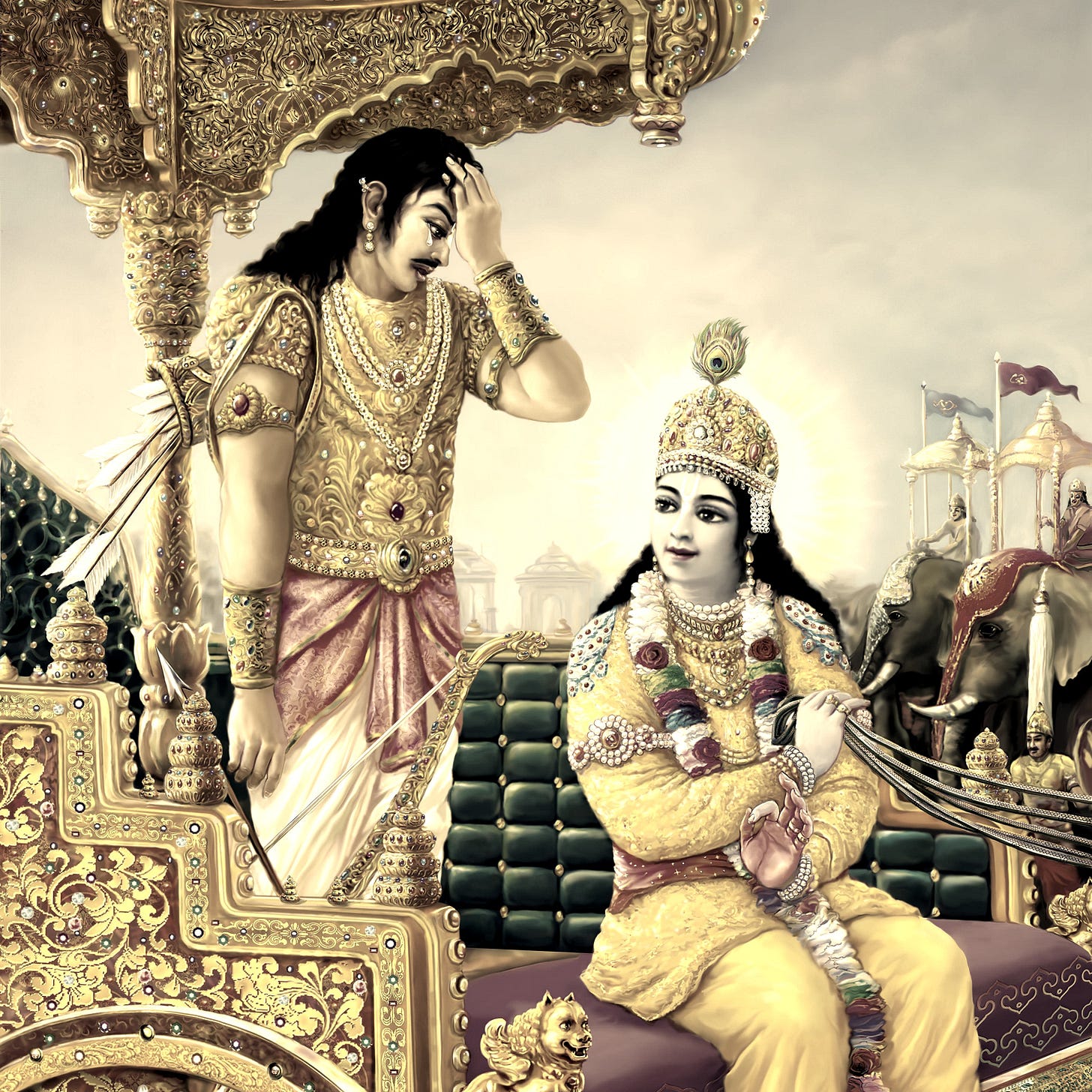Krsna assumes a new role and chastises Arjuna (Bg 2.11)
The central fault in Arjuna's arguments was the identification of the material body as the self. He thought Bhīṣma and Droṇa were their mortal bodies, and concluded that by weapons he would kill them.
« The Song of God: An in-depth study of the Bhagavad-gītā (Volume 1)
Verse 11: śrī-bhagavān uvāca
aśocyān anvaśocas tvam, prajñā-vādāmś ca bhāṣase
gatāsūn agatāsūmś ca, nānuśocanti paṇḍitāḥ
The Supreme Personality of Godhead said: While speaking learned words, you are mourning for what is not worthy of grief. Those who are wise lament neither for the living nor for the dead.
The word prahasan in the previous verse means "smiling". Krsna was smiling because His friend Arjuna had become a disciple, allowing him to destroy his doubts. Arjuna is the eternal friend of Krsna, this is his eternal constitutional position as a soul. As it will be revealed later, in the 4th chapter, Arjuna appears together with Krsna in different situations and different universes. Just as a king always appears accompanied by his retinue, Krsna always appears together with His eternal associates. As a friend, Krsna smiled at Arjuna, almost in a joking mood, but this smile quickly gave way to a grave expression, revealing the seriousness of the talks between guru and disciple. After that, Krsna was not in the mood of joking, but in the mood of revealing the truth for the benefit of Arjuna.
As Prabhupada explains: "Kṛṣṇa was smiling because a friend had chosen to become a disciple. As Lord of all, He is always in the superior position as the master of everyone, and yet the Lord agrees to be a friend, a son or a lover for a devotee who wants Him in such a role. But when He was accepted as the master, He at once assumed the role and talked with the disciple like the master – with gravity, as it is required."
Krsna is prepared to reciprocate with all souls who approach Him. Now that Arjuna had accepted Krsna as His spiritual master, Krsna is prepared to reciprocate by assuming the role of a guru. In a serious tone, He immediately brings the conversation to a higher level by stating: "While speaking learned words, you are mourning for what is not worthy of grief. Those who are wise lament neither for the living nor for the dead."
The central fault in Arjuna's arguments was the identification of the material body as the self. He thought Bhīṣma and Droṇa were their mortal bodies, and thus concluded that by attacking them with mortal weapons, he would kill them. By basing his whole reasoning on this false premise, all his logic was incorrect, and his conclusion of not fighting was equivocal. Krsna, however, went directly to the root cause of the problem and countered it by reminding Arjuna that we are not the body.
Arjuna was speaking like a scholar, using wise words, but Krsna was precise in telling him that in reality, he was behaving like a fool by lamenting the loss of the body while forgetting the existence of the soul. A mundane person cries at the funeral of a relative, lamenting that "my father is gone" or "my mother is gone", without realizing that the whole time his father or mother was present, he never associated with the true person, relating instead with just the body. Now that the real person is gone, he laments, even though the body he loved so much is still there. Arjuna was repeating the same mistake, and thus Krsna indirectly called him a fool by saying that a panditā (a learned person) doesn't lament in such a way.
The fact that Krsna and Arjuna were talking in between the two armies, allowing everyone to hear their conversation, is also significant, emphasizing the universality of the Bhagavad-gītā, as a book of knowledge destined for all people. Everyone is a soul, part and parcel of Krsna. We are all bewildered by the ignorance of the age we live in, and Krsna left us the Bhagavad-gītā as a beacon of light to guide us out. In this way, Arjuna became the original recipient of a book of knowledge that is destined for all of us.
Main points in the purport of Srila Prabhupada:
"The Supreme Personality of Godhead said: While speaking learned words, you are mourning for what is not worthy of grief. Those who are wise lament neither for the living nor for the dead."
a) Arjuna posed his arguments while lamenting for the body, something that is unworthy of lamentation. Because he was lacking in this essential knowledge, he should not have posed as a learned man. As the spiritual master, Krsna immediately chastises his disciple
b) The body is temporary and will eventually come to an end, be it today or tomorrow, therefore, it is not as important as the soul. One who knows the difference between the temporary and eternal does not lament.
« The Song of God: An in-depth study of the Bhagavad-gītā (Volume 1)


